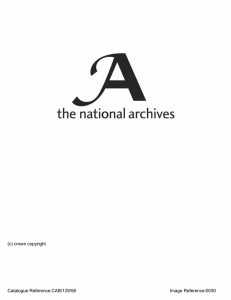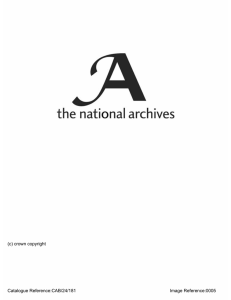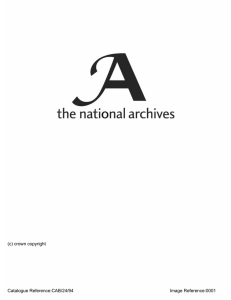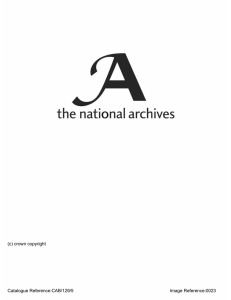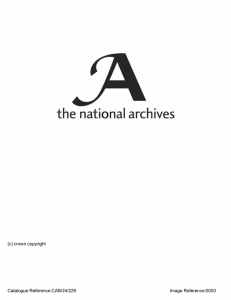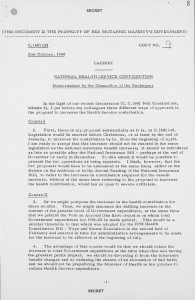(c) crown copyright Catalogue Reference:CAB/129/67 Image Reference:0039
advertisement
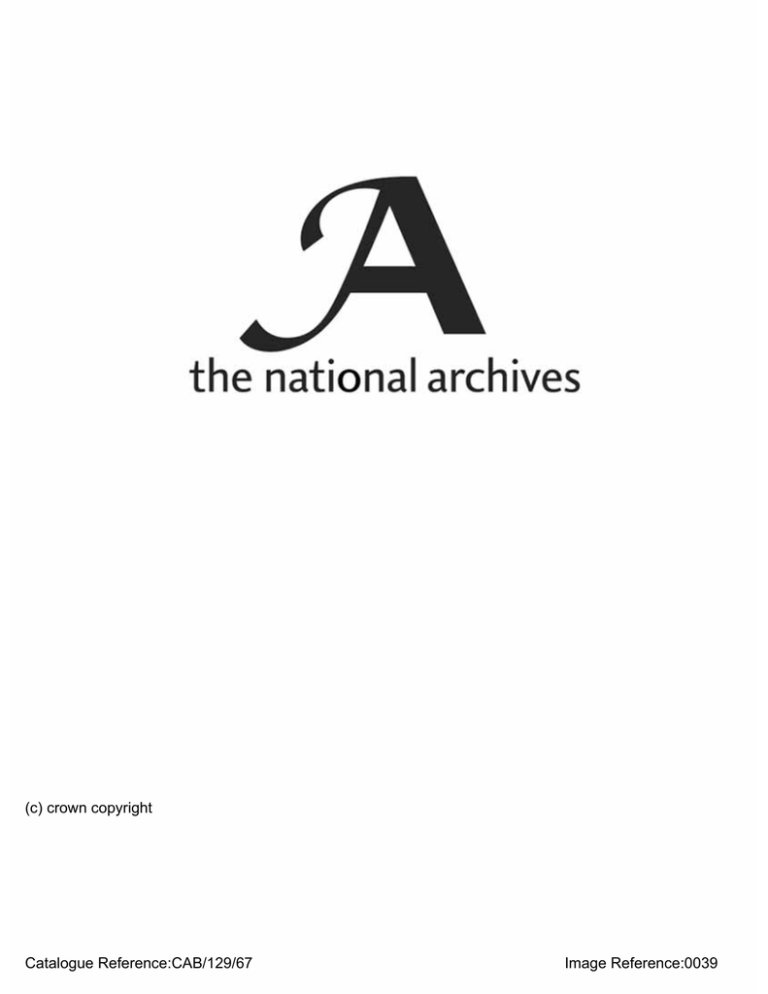
(c) crown copyright Catalogue Reference:CAB/129/67 Image Reference:0039 Printed for the Cabinet. April 1954 SECRET C. (54) 139 9th April, 1954 CABINET OFFICE RECORD COPY Copy No. CABINET PENSIONS MEMORANDUM BY THE CHANCELLOR OF THE EXCHEQUER I am glad that the Minister of Pensions and National Insurance has brought this matter before the Cabinet, for this is one of the most difficult problems we have. 2. I naturally weighed all the considerations with great care and sympathy before my Budget speech, and this is what I said: — " I am not unmindful of the many other claims on the Exchequer, which the Government would wish, in equity, to satisfy. Some of these—for instance, the problems of the old people—are very much in the minds of every Member of this Committee, not least myself. But I have described the already heavy and growing burdens on the Exchequer and I must say this to the Committee: that I cannot bring my conscience to sanction further advances in social reform, involving increases in public expenditure, until we have the growth of our existing commitments well in hand. Only then can we make further progress in meeting some of the claims which are pressing upon us. " My right hon. Friend the Minister of National Insurance, and indeed the whole Government and all Members of this Committee, have continually in mind the needs of the old people. But no one who reflects for a moment on the immense burden which the working population, and particularly the younger generation, will have to carry in the interests of elderly retired people, could think it right to reach a decision about the future welfare of the old without the fullest consideration of the effect on the cost which future genera­ tions will have to meet. This is the year in which a review of the National Insurance F u n d is taking place—the first comprehensive review under the new legislation. Moreover, the Phillips Committee is investigating the prob­ lems of an ageing population. It will be useful to have the results of those reviews. But our urgent task, in the interests of the old, is to ensure that the outlook for public expenditure as a whole is less menacing than it is at present." 3. I am sure that we must check the growth of our total expenditure before we embark upon new social spending, however strong the case for this may be. In particular, it would surely be wrong for us to go forward to increase pension benefits without taking action at the same time to mitigate the burden on the next generation. 4. In pensions, what we must watch is always the ultimate cost and not just the cost in the first year. In February, 1953, the Minister of Pensions and National Insurance and I circulated a report by officials (C. (53) 59) which set out the facts. This showed how the expenditure on retirement pensions is likely to double from 1953-54 to 1977-78. It showed how the total expenditure on national insurance benefits will rise by over £400 millions a year, with no increase in the income; and how the National Insurance Fund, which is at the moment in balance, will in the course of the next few years move rapidly into deficit, requiring Exchequer Grants of £417 millions in 1977-78 plus a regular £68 millions Exchequer contribution. The load on the Exchequer in the next 25 years is due to grow, with a cumulative increase of £17 millions a year. 46026 g3 2 5. It was, of course, this picture Which led rrie to set up the Phillips Committee to advise us on -these matters. -Whenever we -consider the pensions problem, this long-term impact is what must dominate our minds. ',6. "In C. (54) 138 the Minister of Pensions and National Insurance shows that the effect of increasing the basic standard benefit for a single person by 5.y. would be to add a further £58 millions a year to the Exchequer grant of £41.7 millions a year required in 1977-78. If we were to do this, the annual cumulative increase in the load on the Exchequer would be raised from £17 millions to £20 millions. 7. Even the immediate financial impact would not be quite as favourable as might be thought at first sight. The Minister of Pensions and National Insurance shows a net saving of £6-^ millions in the first full year, which would offset most of the cost of the increased war pensions, leaving only a small net Exchequer charge. But there are other considerations which enter into this picture, as the Minister would certainly agree: — (a) The saving is achieved by ;a reduction of £17 millions in National Assistance. This would imply that 1£ million people who are at present getting benefits for themselves and their dependants supplemented by National Assistance would receive no net advantage from the -increase i n the pension rate. There is no reason in equity why they should, and the figures in paragraph .2 of.the Ministers paper are very striking in that they show how generous the present assistance scales are. But we should be - under very heavy pressure indeed for a corresponding increase in assistance scales. (b) The illustration postulates increases in contributions.ranging up to Is. 2d. in respect of an employed man (National Insurance only). The Exchequer would in effect he paying a substantial part.of this by loss of tax revenue; about two-thirds of the employees' contribution is given tax relief, and the employers' contribution is of course allowed as an expense, so that the cost is,borne.either.by the Exchequer in loss of tax revenue or by consumers generally^inincreased prices. ; 8. I must stress both the : long-term financial burden a n d . the short-term indirect losses to the Exchequer, a n d - I must say again that we should not be justified in increasing the benefits without, at the same time taking effective steps to relieve the burden on the,next generation. R. A. B. Treasury Chambers, S.W. 1, 9th April, 1954.

